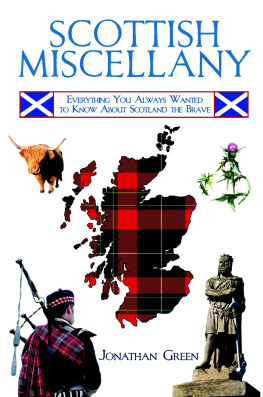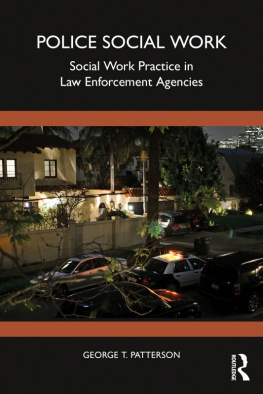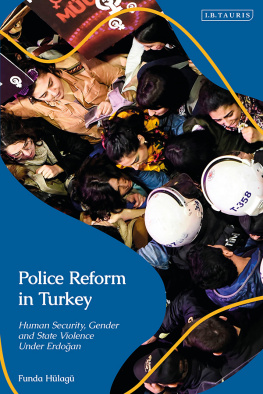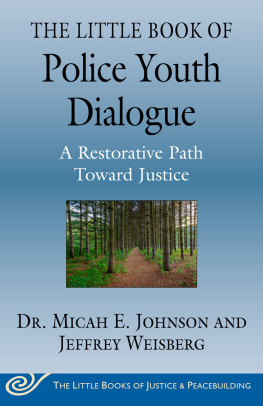Police in the Age of Improvement
Police in the Age of Improvement
Police development and the civic tradition in Scotland, 17751865
David G. Barrie
First Published by Willan Publishing 2008
This edition published by Taylor & Francis 2011
2 Park Square
Milton Park
Abingdon
OX14 4RN
Published simultaneously in the USA and Canada by
711 Third Avenue
New York
NY 10017
Routledge is an imprint of the Taylor & Francis Group, an informa business
David G. Barrie 2008
The rights of David G. Barrie to be identified as the author of this book have been asserted by him in accordance with the Copyright, Designs and Patents Act of 1988.
All rights reserved; no part of this publication may be reproduced, stored in a retrieval system, or transmitted in any form or by any means, electronic, mechanical, photocopying, recording or otherwise without the prior written permission of the Publishers or a licence permitting copying in the UK issued by the Copyright Licensing Agency Ltd, Saffron House, 610 Kirby Street, London EC1N 8TS.
ISBN 978-1-84392-266-7 hardback
British Library Cataloguing-in-Publication Data
A catalogue record for this book is available from the British Library.
Project managed by Deer Park Productions
Typeset by GCS, Leighton Buzzard, Bedfordshire
Contents
ACA | Aberdeen City Archives |
DCA | Dundee City Archives |
DCL | Dundee Central Library |
DAC | Dumfries Archive Centre |
DI | Dick Institute (Kilmarnock) |
ECA | Edinburgh City Archives |
ECL | Edinburgh Central Library |
GCA | Glasgow City Archives |
GUL | Glasgow University Library |
ML | Mitchell Library (Glasgow) |
NAS | National Archives of Scotland |
NLS | National Library of Scotland |
PCL | Paisley Central Library |
PKCA | Perth and Kinross Council Archives |
PP | Parliamentary Papers |
In researching and preparing this book I have received generous assistance from several colleagues, librarians and archivists. Christopher A. Whatley, Bob Morris and Charles McKean kindly commented on a number of chapters. Their views were much appreciated and extremely helpful. T.M. Devine and W.H. Fraser supervised the doctoral thesis on which a small (very small) part of this study is based. Both were extremely generous in giving useful advice and support. Robert D. Storch and Clive Emsley provided insightful comments in reviewing the book proposal. Iain Hutchison and Frank Montgomery did a good job in proof-reading the manuscript, often at fairly short notice. A large debt is owed to Brian Willan for his patience and understanding. His willingness to grant extension after extension made the completion of this project possible. To all, I am extremely grateful. Naturally, none of the above is responsible for any mistakes which may remain or any of the arguments which have been advanced.
Archivists and librarians in the following institutions provided much appreciated assistance: Glasgow City Archives; the Mitchell Library (Glasgow); Glasgow University Library; Glasgow Caledonian University Library; the National Archives of Scotland; the National Library of Scotland; Edinburgh Central Library; the Signet Library (Edinburgh); the Andersonian Library (Glasgow); Dundee City Archives; Dundee Central Library; the A.K. Bell Library (Perth); Perth and Kinross Council Archives; The Dick Institute (Kilmarnock); Paisley Central Library; Dumfries and Galloway Archives; Aberdeen City Archives; and Fife Council Archive Centre.
A note of thanks must also go to the historians whose work has been cited in this book. Their efforts made it easier to make sense of what seemed like an endless dredge through source material. I apologise if their work has in any way been misinterpreted.
Special thanks are owed to the Economic and Social Research Council for providing a small research grant (RES-000-22-1758) which enabled this book to be completed. I am grateful also to the School of Law and Social Sciences at Glasgow Caledonian University for providing institutional support for this project.
Finally, and most importantly, thank you to my family for their encouragement and help.
To Mum and in memory of Dad
Police history in Scotland has been largely neglected. Unlike the case with other parts of the British Isles, there has been little scholarly investigation into the Scottish polices origins and development.1 What work has been produced tends to be anecdotal accounts by former officers or commemorative institutional histories.2 While informative, these rarely venture beyond amusing case studies and are tinted with the oversimplistic patriotic boast that modern policing emerged in Scotland before England.3 Serious academic scrutiny has been limited to the odd article and unpublished thesis, but these often focus more on public administration and urban improvement rather than law enforcement.4 The main published exceptions to this are Carson and Idzikowskas pioneering study and a few short, but interesting, articles.5 However, these are fairly narrow in outlook. The latter concentrate primarily on early law enforcement initiatives in Glasgow rather than across the country, while the former ignores the economic, social and political pressures behind reform in urban centres in favour of the police institutions ongoing evolution to the end of the nineteenth century.6 Consequently, the history of police in Scotland remains very much in its infancy.
Scottish historians in this field have focused more on the forces of conflict and disorder rather than law and order. This history from below approach has produced fascinating studies on social protest, working-class militancy and political radicalism, but little on the day-to-day agencies that had to deal with crime and crowds beyond Godly discipline, eighteenth-century paternalism and the supply of the food market.7 Where police records have been used, the tendency has been to examine the impact of urban and industrial growth on public health, municipal provisions and local government.8 Less attention has been given to the mechanisms of control and the economic, social and political context in which they emerged and operated.
The older, pioneering studies into British police history, meanwhile, were mainly written from a parochial, English perspective. In fact, it is probably more accurate to argue that these were constructed from a metropolitan viewpoint given that provincial England was often given the same limited attention as Scotland. Allied to its size and importance, the traditionally held assumption that police reform occurred first in London in 1829 resulted in an unfortunate, if understandable, overconcentration on the Metropolitan Police. At best, these studies make only fleeting reference to Scottish policing and usually only when it has implications for law enforcement in England.9 More often than not, Scotland is completely overlooked. Reith, in








